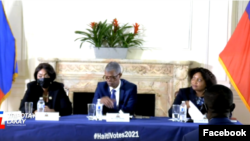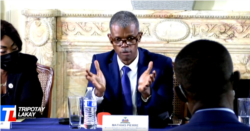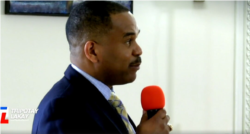Members of Haiti's diaspora expressed concerns Tuesday about the country’s ongoing insecurity, the economic crisis and the lack of information about the new draft constitution, during a virtual event hosted by the Haitian Embassy in Washington.
The two-hour event, streamed live on Facebook, got off to a late start and struggled with technical issues. But it offered the diaspora an opportunity to ask Haiti's top election officials questions about the draft constitution, which includes new privileges and representation for Haitians living abroad.
A small group of people at the embassy, who were socially distanced and wearing face masks due to COVID-19 restrictions, asked questions. Others submitted questions on social media.
President Jovenel Moise said a new constitution is needed to fix problems in the current charter, which was adopted in 1987. Critics say Moise's effort is just an attempt to consolidate power. Among the proposed changes of interest to Haitians living abroad are the ability for the diaspora to run for office and the designation of a set group of lawmakers in the Chamber of Deputies to represent them in Parliament.
The 2018 U.S. census estimates there are more than 1 million Haitian Americans living in the United States. The largest group resides in South Florida.
The top concern raised by town hall participants was insecurity.
"Everyone's scared," said a woman who identified herself as a former singer and activist who has been living in the U.S. since the 1980s.
The Haitian minister-delegate in charge of elections, Mathias Pierre, blamed bad actors.
"The government understands we have a security issue, but we want to tell people that the issue is not a coincidence — whenever there are elections, there are security issues," the minister said. "This has happened in the past. We have had kidnappings around elections. I was talking to a politician who told me as soon as Jovenel (Moise) is gone, the insecurity will end. Does he know something we don't know?"
Pierre acknowledged that kidnappings are a major concern and told the audience the government has taken measures to address it. He cited a state of emergency in neighborhoods where the kidnappers reside and hold captives, and the establishment of specialized cells within the national police force tasked with addressing abductions.
Others worried about the ongoing economic crisis. Many Haitians living in the United States would like to buy and build homes, invest and open businesses in Haiti but are hesitant to do so.
"The economic crisis is a consequence of the political instability," Pierre said. "When you have a society where democracy cannot function properly, it causes economic crises. That's why we need to have elections to elect officials who can help the country move forward."
A man who identified himself as a lawyer asked why the electoral process had not been more inclusive.
"I have some issues with why there is no effort made to have more people participate in the process" he said.
"The participation of the diaspora is not easy," Guylande Mesadieu, president of the Provisional Electoral Council, said. " If it were easy, we would have done it already. We are committed to working toward 5% of the diaspora being represented in the government. The government is very interested in having the diaspora participate in the process. That's why we traveled here today to talk to you about the constitution."
Only 7% of eligible Haitian voters participated in the 2015 presidential election that brought Moise to power, according to Pierre. He said diaspora participation could make a difference.
"If the diaspora decides to seriously participate in the process, we can up our participation rate to 36%. And then, you'll see what your participation means to the process," he told the audience.
The last question pertained to making it easy for people who live far from the embassies and consulates to vote.
"If that hasn't been done, it's a waste of time," the questioner said.
"The CEP (Provisional Electoral Council) has several scenarios that it has planned for," Pierre responded. "We have created platforms. We have technology to help us determine where the voters are. We are looking at different scenarios, and I think the diaspora will be the first to know. This constitutional referendum will be a test not only for us but also for the diaspora."
Many questions went unanswered because of time constraints, but Haiti's ambassador to the U.S., Bocchit Edmond, vowed to hold more town halls soon.
"I know your time is precious, and if you took the time to come here, it's because you thought it was important. Thanks to those watching online," Edmond said. "We are available to address your concerns. I would like for the diaspora to participate, and we will do everything in our power to make that happen."






